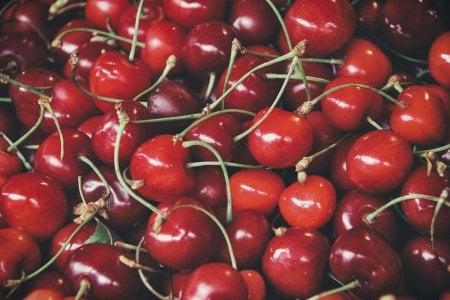Shortage of this produce threatens holiday traditions amid challenging weather conditions
- Replies 11
As we deck the halls and prepare for the festive season, a shadow looms over one of our cherished Christmas traditions.
A shortage of key produce is causing concern among growers, with one particular crop facing significant challenges.
Experts warn that supply issues could lead to higher prices and reduced availability, potentially impacting celebrations and family gatherings.
The situation is leaving many wondering how this shortage will affect seasonal traditions and whether consumers will need to adjust their expectations.
A cherished Christmas favourite could be absent from some dinner tables this festive season following a ‘devastating blow’ to Western Australian cherry growers.
The Southern Forest Food Council (SFFC), which represents growers in the Manjimup region of Western Australia, has predicted cherry crop losses of more than 90 per cent due to ‘tough seasonal conditions’.
According to the SFFC, the combination of hot, dry, and windy summer conditions, an unusually warm winter, and minimal frosts has led to a substantial decrease in yields across the state.

SFFC Chairman Arthur Wilson cautioned that the financial impact would be significant, with major losses and fewer seasonal jobs for the region's cherry farmers.
‘Cherries are a high-risk, high-reward crop,’ he pointed out.
‘While farmers are accustomed to some variability, this season's challenges have been unprecedented.’
Environmental factors can greatly affect delicate cherry crops, as summer rain can cause the fruit to crack, and warm winters may hinder proper fruit development.
The impact extends beyond cherries, with concerns also raised about the yields of truffles and avocados.
In response, cherry orchards have been set up in Manjimup and other areas to help stabilise local supply and decrease dependence on cherries imported from other states.
‘Farmers are resilient and innovative,’ Chairman Wilson remarked.
‘They're constantly adapting and investing in innovative solutions to better prepare for a changing climate.’
‘It's an incredibly challenging time for our producers, but we are committed to working alongside them, promoting sustainability and championing their efforts in the face of adversity,’ he added.
The cherry shortage comes as a result of a combination of challenging weather conditions, leaving many concerned about the impact on prices this festive season.
This situation echoes last year's price surge when devastating storms significantly increased the cost of cherries.
With similar circumstances at play again, consumers may face another round of steep price hikes, especially during the holiday season.

Have you noticed any changes in the availability or pricing of your favourite holiday foods this year? How do you plan on going around them? Share your experiences and how you're adapting your Christmas celebrations in the comments below.
A shortage of key produce is causing concern among growers, with one particular crop facing significant challenges.
Experts warn that supply issues could lead to higher prices and reduced availability, potentially impacting celebrations and family gatherings.
The situation is leaving many wondering how this shortage will affect seasonal traditions and whether consumers will need to adjust their expectations.
A cherished Christmas favourite could be absent from some dinner tables this festive season following a ‘devastating blow’ to Western Australian cherry growers.
The Southern Forest Food Council (SFFC), which represents growers in the Manjimup region of Western Australia, has predicted cherry crop losses of more than 90 per cent due to ‘tough seasonal conditions’.
According to the SFFC, the combination of hot, dry, and windy summer conditions, an unusually warm winter, and minimal frosts has led to a substantial decrease in yields across the state.

The Southern Forest Food Council warns of over 90 per cent of cherry crop losses in the Manjimup region due to harsh seasonal conditions. Credit: Pexels / Simon Berger
SFFC Chairman Arthur Wilson cautioned that the financial impact would be significant, with major losses and fewer seasonal jobs for the region's cherry farmers.
‘Cherries are a high-risk, high-reward crop,’ he pointed out.
‘While farmers are accustomed to some variability, this season's challenges have been unprecedented.’
Environmental factors can greatly affect delicate cherry crops, as summer rain can cause the fruit to crack, and warm winters may hinder proper fruit development.
The impact extends beyond cherries, with concerns also raised about the yields of truffles and avocados.
In response, cherry orchards have been set up in Manjimup and other areas to help stabilise local supply and decrease dependence on cherries imported from other states.
‘Farmers are resilient and innovative,’ Chairman Wilson remarked.
‘They're constantly adapting and investing in innovative solutions to better prepare for a changing climate.’
‘It's an incredibly challenging time for our producers, but we are committed to working alongside them, promoting sustainability and championing their efforts in the face of adversity,’ he added.
The cherry shortage comes as a result of a combination of challenging weather conditions, leaving many concerned about the impact on prices this festive season.
This situation echoes last year's price surge when devastating storms significantly increased the cost of cherries.
With similar circumstances at play again, consumers may face another round of steep price hikes, especially during the holiday season.
Key Takeaways
- The Southern Forest Food Council has warned of over 90 per cent cherry crop losses in the Manjimup region due to tough seasonal conditions.
- Unusually hot and dry weather, in addition to a warm winter with minimal frosts, has led to reduced yields for cherries and other produce such as truffles and avocados.
- SFFC Chairman Arthur Wilson highlighted the severe financial impact on farmers and the decrease in seasonal jobs due to crop losses.
- In response to the climate challenges, cherry plantations have been established in the region to stabilize supply and lessen dependence on imported cherries, with farmers adopting innovative solutions for future sustainability.







